Mental Fitness
Techniques and resources Duke colleagues use for emotional health

Rachel Meyer boxes at MADabolic gym in Raleigh earlier this year. Photo by Alex Boerner.

In a staggered stance, Rachel Meyer faces the teardrop-shaped punching bag. Filled with water and weighing nearly 200 pounds, the bag hangs in the MADabolic gym in Raleigh, ready to absorb Meyer's energy.
Elbows tight against her sides, Meyer turns her hips and throws a combination of blows: jab, cross, upper cut, hook. Electronic dance music fills the gym as she punches, working her right side, then the left.
When a digital timer on the wall stops, she pulls off a black and teal glove and looks down at her bare knuckles. "A little red. Not too bad," Meyer says with a grin.
Boxing is part of Meyer's therapy, an antidote for anxiety and recent life changes, including the end of a long-term relationship and buying her first home. To manage stress, she is intentional with self-care, building a robust toolbox that includes everything from group exercise classes and time with family and friends to regular talks with a counselor through the Cigna behavioral health benefit and monitoring symptoms with her primary care physician.
"I think we live in a culture where it's really easy to have high expectations of yourself, which, for me, leads to excessive worrying," said Meyer, 37, who has worked at Duke eight years and develops and implements holistic wellness programs for clergy and congregations through the Divinity School. "I'm better able to manage my anxiety if I'm exercising."
According to the "Gallup Global Emotions" report and U.S. results shared in 2019, more Americans were "stressed, angry and worried" than at most times during the previous 10 years. And the National Alliance on Mental Illness reports that one in five U.S. adults experience mental illness, which includes depression, anxiety disorders and other conditions.
At Duke, the Personal Assistance Service provides up to eight confidential counseling sessions per concern at no charge for staff and faculty and immediate family members. Last year, the service saw the highest use by clients than in previous years. Many seek support for emotional concerns such as depression, anxiety, stress and grief, and most clients report improved coping and productivity after using the service.
Dr. Beth-Anne Blue, assistant director for Personal Assistance Service, said the stigma associated with mental health concerns has decreased. More people are talking publicly about challenges. "You don't need a huge reason to come and seek our services," she said.
When she sees a new client, Blue asks about self-care and setting healthy boundaries for activities that bring joy.
"Are you cutting out enough time in your life to do the things that make you and only you happy and building some reserve?" she asked. "A happy employee is going to be a productive employee."
Many Duke employees, like Meyer who boxes, are taking Blue's question to heart, implementing well-being techniques in their lives. They share their experiences to help other colleagues who also encounter stressful or emotional times in a tumultuous world.
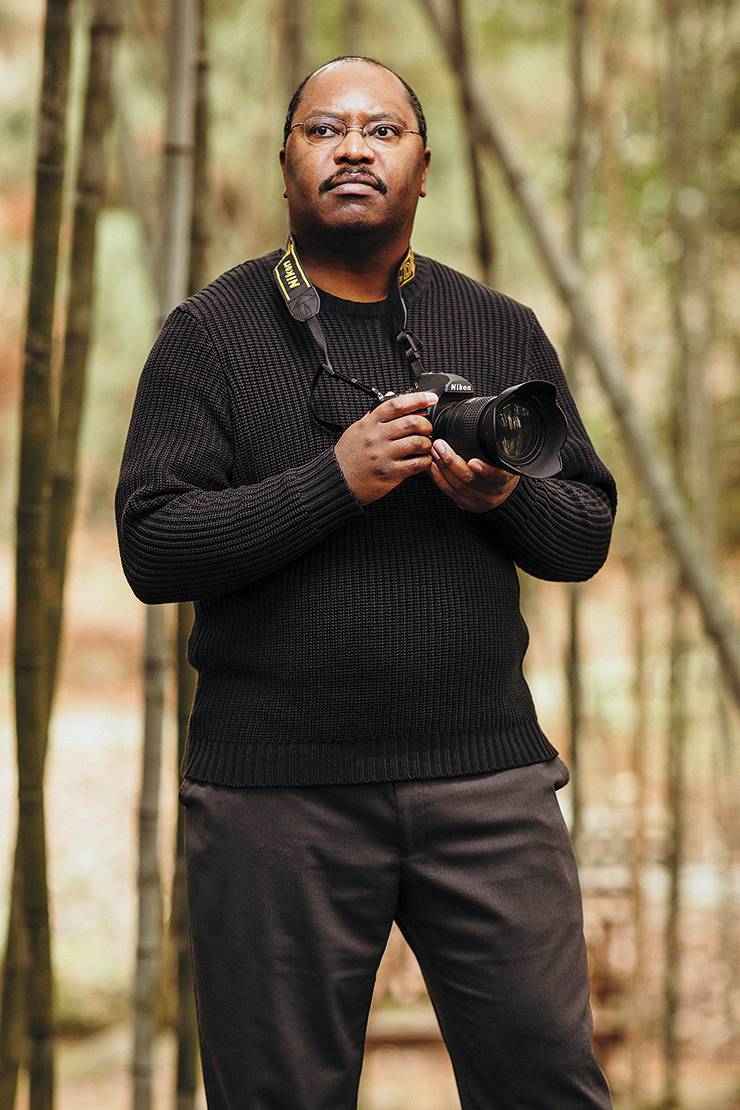

William Hanley III, 40
Electronic Resources Management Specialist
Duke University Libraries
Concern: William's primary concern involves the well-being of his brother, who is studying electrical engineering. After their parents passed away, William, the full-time wage-earner, wanted to help his only immediate family. "I care about him a lot," William said of his younger brother. "It's just me and him."
Well-being practice: Wherever he goes, William carries his Nikon camera. You can usually find him in Sarah P. Duke Gardens, capturing close-ups of plants and blooming beds as a volunteer photographer. In these moments strolling in nature, typically on Saturdays, he is fully present, mindful of the 55 acres of beauty around him. "Whenever I walk around Duke Gardens, I feel peaceful," he says. "I let nature unfold around me. I don't try to go into nature and look for stuff. I stand or sit and let things flow around me. I allow God to unveil nature to me." His pictures have appeared on the gardens' social media accounts and in a gardens photo journal with blank pages for writing, drawing and journaling. Making pictures is a meditative practice for him. "When I think about where I am right in that minute, I don't think of my troubles, and I don't think of worries," William says. "It helps to quiet my mind."
Resources used: William, who has worked at Duke for 14 years, has used Duke Personal Assistance Service, and he talks with a therapist through the Cigna behavioral health benefit. Employees covered by Duke's most popular medical plan - Duke Select - pay $20 for in-network visits through the Cigna benefit. William says Duke's mental health and wellness offerings through the Healthy Duke initiative are among the most valuable resources. "It's one of the reasons that keeps me at Duke," he said. "I'm not sure if I would want to go anywhere else because the benefits are so good."

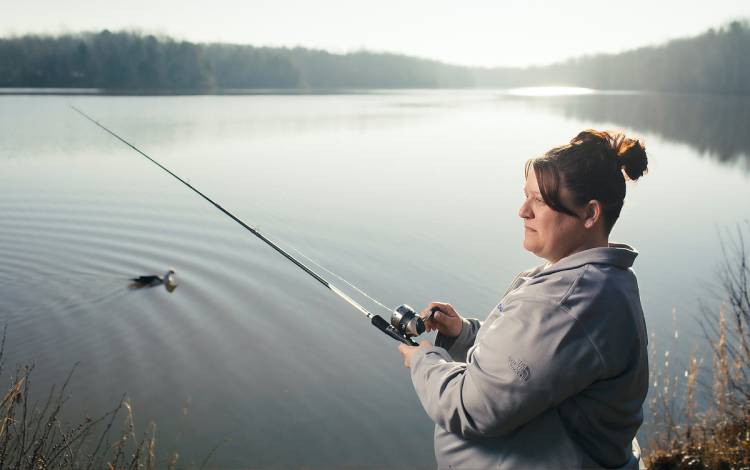

Katie Lumpkins, 35
Certified Medical Assistant
Duke University Hospital, Cancer Center Clinic
Concern: Katie, who moved from Maine and took a job at Duke in 2018, experiences effects of family concerns, including the divorce of her parents. She has been diagnosed with depression, and she's not alone. According to the National Alliance on Mental Illness, more than 17 million U.S. adults experienced at least one major depressive episode in the past year. "I can go through really happy times, and then a lot of the times when I'm alone and I've had too much time to think, that's when I tend to start beating myself up for things and thinking about things too much," Katie said.
Well-being practice: She makes kombucha and goes fishing to feel the sun on her skin. "It allows my brain to focus on something else," she says of fishing. "And that's a big thing - if I can just get out of that one-track mind that I have going on at the moment." At work, Katie finds comfort in the 60 seconds of well-being that cap off daily staff huddles in her clinic. Led by Margaret Leddy, a physician assistant in the melanoma surgery clinic, the well-being minute centers on integrating a helpful practice into life such as accepting a compliment or offering a compliment that speaks to the core of a person. "If you can just get little pieces and parts of positive psychology, you can start rewiring the brain and make some shifts to the positive," Leddy said.
Resources used: Katie asks for help when she recognizes events or circumstances that bring on a low mood and cloudy thinking. Last year, after putting her 16-year-old cat, Booger, to sleep, Katie fell into despair. Booger, who was born in Katie's living room, had been with Katie for her adult life. When her mood changed, Katie reached out to the Personal Assistance Service. "I did the support services a couple of different times to get back on a better track," Katie said.
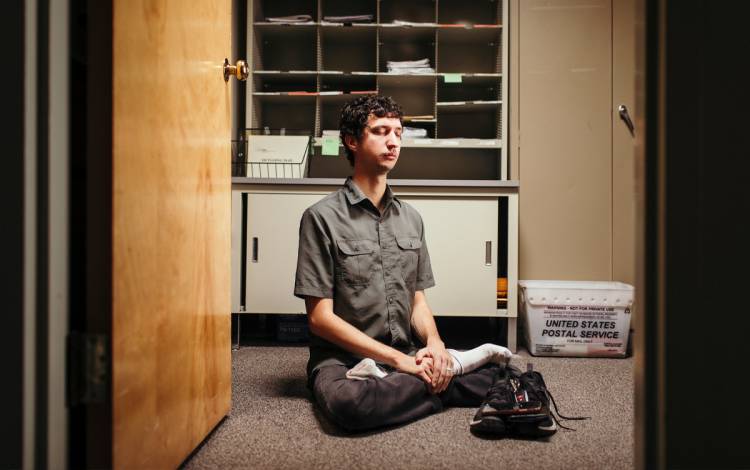

IAN PHILIPP, Ph.D., 29
Statistician
Biodemography of Aging Research Unit
Concern: Ian, who studies the genetics of Alzheimer's Disease for the Social Science Research Institute, has general anxiety disorder. For him, a worry about an interaction or a fear of making a mistake writing code can derail his day. "It just starts to permeate all my thoughts," he explained. "This negative nature, this worry about everything basically." The National Alliance on Mental Illness reports that anxiety disorders are the most common mental health concern in the U.S.; more than 40 million adults experience an anxiety disorder, which involves persistent, excessive fear or worry in situations that are not threatening.
Well-being practice: To ease worries, Ian meditates daily for 20 minutes. He often finds a spot in his office building, where he closes his eyes, focuses on his breath and lets thoughts dissolve. He credits therapy and meditation for discontinuing medication. "As someone who suffers from generalized anxiety disorder, meditation saved me," Ian said. "And when I am most consistent, the effects are dramatic: I take things less personally, and my worry is under control instead of incapacitating me." For anyone who wants to begin a practice, Ian recommends the book "Zen Mind, Beginner's Mind" by Shunryu Suzuki. "Meditation and just being mindful in general helps you separate the past and the future from the present, which fixes your anxiety," Ian said. "If you can turn off your thoughts about the future and your thoughts about the past, there's nothing to be anxious about."
Resources used: With Duke's Cigna behavioral health benefit, Ian sees a therapist for help sorting out emotions. "Sometimes they paraphrase what you said in such a concise way that it's like a breakthrough," he said. "That can really help you get hold of your thought patterns."


Gloria Manley, 58
Financial Care Counselor
Patient Revenue Management Organization, Duke Outpatient Clinic
Concern: Gloria struggled when she went through a divorce five years ago. "I was depressed and sad," she said. "I had my daughters, and I was trying to be strong for them."
Well-being practice: Gloria, whose office walls are dotted with motivational quotes such as "Today is the Day," begins her day with a prayer and ends each day by writing down "three good things" from the day. Her positive reflections vary but favorite moments involve encouraging loved ones, including her 80-year-old mother, Grace, and daughters, Amber and Taylor. She often lends a sympathetic ear to patients and colleagues in Duke Outpatient Clinic, which provides her a sense of service. Writing down three positive things for at least two weeks can train your brain to focus on positive emotions and not dwell on the negative. "And that has a spiraling effect," said Carrie Adair, Ph.D., assistant director for Duke Center for Healthcare Safety and Quality. Adair, Bryan Sexton and their collaborators are leaders in conducting research on healthcare worker burnout and resilience. The center provides an array of resiliency tools.
Resource used: During the divorce, Gloria received help from Personal Assistance Service to confidently make a change in her life after 18 years of marriage. She talked with a therapist four times at no charge, a benefit she appreciates to this day. "I needed to talk to someone who didn't know me, so that I could just be honest and candid and get a different side and tools on how to move forward," said Gloria, who joined Duke in 1991.
Tip: Get moving each day with a fun, physical activity. As a teenager, music was an outlet for Gloria, who trained under dancer and choreographer Chuck Davis and performs traditional African dance. While she makes time to exercise, she allows an occasional reward. "I do the best I can," said Gloria, adding "and who can say 'no' to Red Lobster's butter and garlic biscuits?"
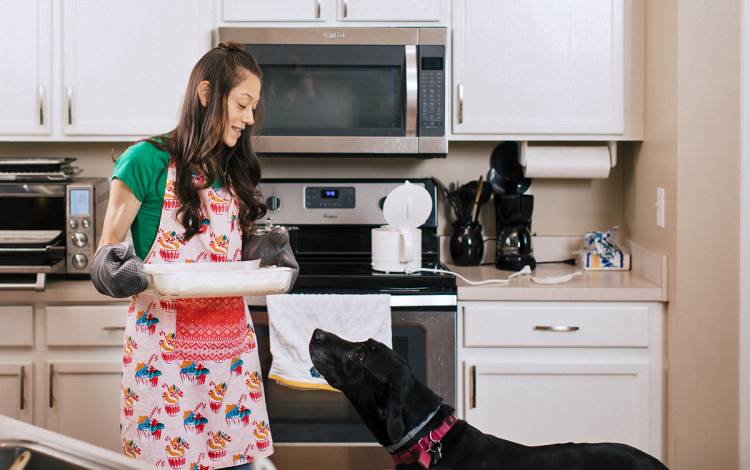

Akemi Huynh, 36
Patient Service Associate
Radiology
Concern: Akemi left her position as a school psychologist after nine years, became a certified nursing assistant and moved from Northern Virginia to join Duke - a career change that ignited a love for chemistry and biology but left her unsure of her next move in healthcare. She's interested in nursing. "I tend to be a pretty linear person," said Akemi, who joined Duke in late 2019. "As long as I can connect A to B and I'm on that path, I'm secure and I'm confident," she said. "Being in this place where I'm switching careers and I don't quite know where I'm going has thrown me."
Well-being practice: Akemi is intentional about planning her days and weeks with activities that bring happiness and joy: rock-climbing, journaling about emotions, trying out new restaurants with her husband, Phong, and cooking for friends. With her dog Sachi by her side in the kitchen, Akemi bakes cheesecakes and sweet potato cupcakes. She's even made yogurt and dim sum. "You achieve that state of flow where nothing else exists, and it's just you in the kitchen," she said.
Resources used: Akemi is rebuilding her professional identity. "It's really taken a hit on my self-esteem," she explained. "When you meet people, what's one of the first questions? 'What do you do?' And right now, I don't have an answer, and I went through a number of months of just internal turmoil. I felt ashamed." To stay positive, she schedules self-care activities and reserves one hour each week to talk with a counselor through the Cigna behavioral health benefit. "I come with the list of notes," she said. "And I say, 'this is what I want to work on, these are my goals.'"
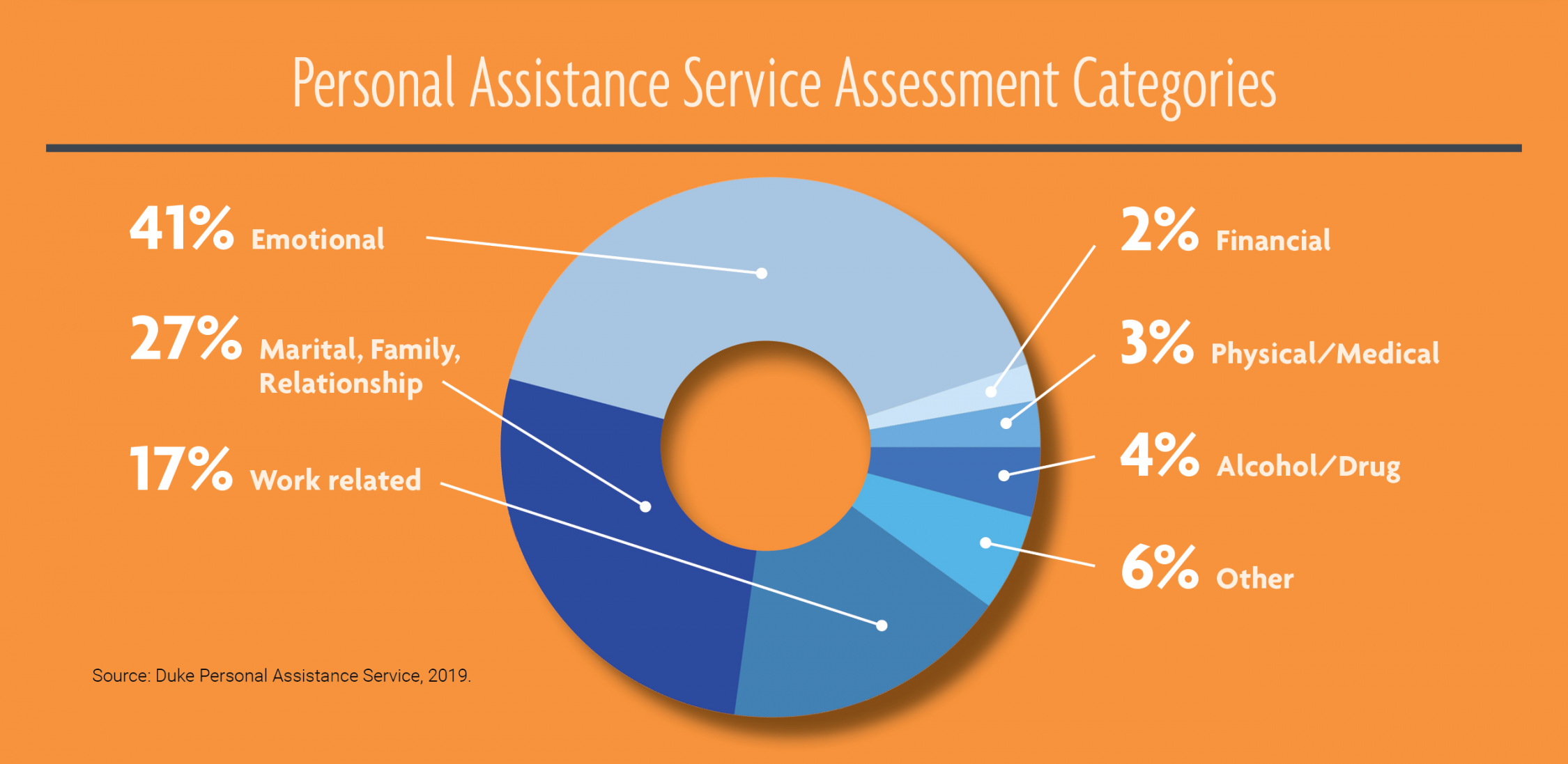
Well-being Tools and Resources
Healthy Duke
The healthy campus initiative focuses on five core areas: food and nutrition; mental and emotional well-being; physical activity and movement; fulfillment and purpose; and environment and culture.
Well-being and happiness strategies
Anyone looking to become a champion of well-being, can use these toolkits of resources to create a culture of well-being or bring more joy into a day.
Meditation and more
Staff and faculty can participate in a variety of free activities at the Student Wellness Center. Offerings include guided meditation, knitting and more.
Duke Personal Assistance Service
Licensed professionals offer assessment, short-term counseling and referrals for personal, work and family problems. Services are available at no charge to benefits-eligible faculty, staff and their family members.
Cigna Behavioral Health benefit
Duke offers outpatient and inpatient behavioral health and substance abuse benefits under its medical plans.
National Alliance on Mental Illness
The National Alliance on Mental Illness (NAMI) is celebrating its 40th anniversary and is the nation's largest grassroots mental health organization.